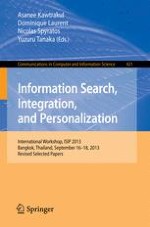2014 | Buch
Information Search, Integration, and Personalization
International Workshop, ISIP 2013, Bangkok, Thailand, September 16--18, 2013. Revised Selected Papers
herausgegeben von: Asanee Kawtrakul, Dominique Laurent, Nicolas Spyratos, Yuzuru Tanaka
Verlag: Springer International Publishing
Buchreihe : Communications in Computer and Information Science
